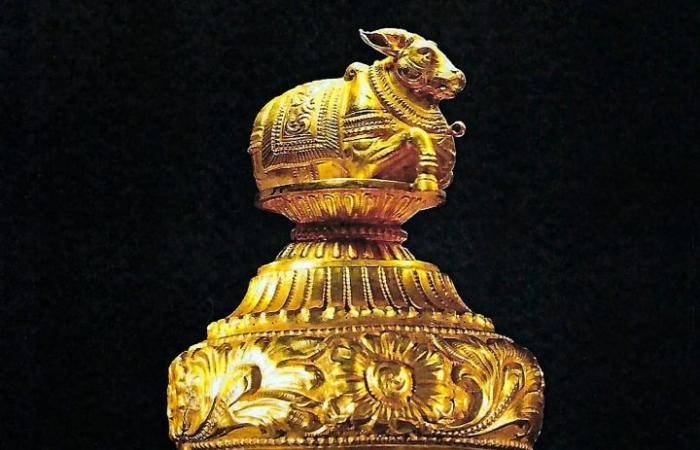
Sengol controversy: Why does Congress hate Indian traditions, Amit Shah hits back

Union Home Minister Amit Shah on Friday (May 26) lashed out at the Congress for discrediting the government’s claim that the Sengol, which is to be ceremoniously placed near the Speaker’s chair on the day of the new Parliament building inauguration on May 28, is a symbol of the British transfer of power to India.
Earlier in the day, Jairam Ramesh, a Congress leader, had hit out at the “bogus” claims made by the BJP, “typical of this brigade that embroiders facts to suit its twisted objectives”, as there is no documented evidence of Lord Mountbatten, C Rajagopalachari, and Jawaharlal Nehru describing the Sengol as a symbol of the British transfer of power to India.
He also alleged that Prime Minister Narendra Modi and his drum-beaters were using the ceremonial sceptre for their political ends in Tamil Nadu.
Amit Shah hit out at the Congress asking in a tweet, “Why does the Congress party hate Indian traditions and culture so much? A sacred ‘Sengol’ was given to Pandit Nehru by a holy Saivite Mutt from Tamil Nadu to symbolize India’s freedom but it was banished to a museum as a ‘walking stick’…Congress is calling Adheenam’s history BOGUS! Congress needs to reflect on their behaviour.”
Further, he also criticised the Congress for insulting the Thiruvaduthurai Adheenam, a holy Saivite Mutt, which had spoken about the importance of the Sengol at the time of India’s freedom. Shah accused the Congress of calling the Adheenam’s history “bogus”.
"Why does the Congress party hate Indian traditions and culture so much? A sacred 'Sengol' was given to Pandit Nehru by a holy Saivite Mutt from Tamil Nadu to symbolize India’s freedom but it was banished to a museum as a ‘walking stick’…Congress is calling Adheenam’s history… pic.twitter.com/6RF87fb02E
— ANI (@ANI) May 26, 2023
The Sengol will be installed close to the Chair of the Lok Sabha speaker after the new Parliament building is inaugurated by Modi on May 28, an event 20 Opposition parties, including the Congress, are boycotting.
Also Read: Explainer: What is ‘Sengol’, who crafted it and what’s its significance?
On Thursday, the BJP had alleged that the Congress displayed disregard for Hindu traditions by calling the sacred Sengol a “golden stick gifted” to India’s first prime minister Nehru and tucking it away in a museum.
The vesting of the “sacred Sengol” with Nehru, on the eve of India’s Independence, was the exact moment of transfer of power from the British to India, BJP leader Amit Malviya had said.
On Twitter, Ramesh said, “The sceptre is now being used by the PM (prime minister) and his drum-beaters for their political ends in Tamil Nadu. This is typical of this brigade that embroiders facts to suit its twisted objectives. The real question is why is President Droupadi Murmu not being allowed to inaugurate the new Parliament.”
He claimed that a majestic sceptre conceived of by a religious establishment in the Madras province and crafted in Madras city (now Chennai) was indeed presented to Nehru in August 1947.
“There is no documented evidence whatsoever of Mountbatten, Rajaji and Nehru describing this sceptre as a symbol of transfer of British power to India. All claims to this effect are plain and simple — bogus,” he said.
Also Read: Historically significant ‘Sengol’ will be installed in new Parliament building: Shah
“Wholly and completely manufactured in the minds of a few and dispersed into WhatsApp, and now to the drum-beaters in the media. Two of the finest Rajaji scholars with impeccable credentials have expressed surprise,” the Congress general secretary communications said.
While announcing the boycott, the Opposition parties had said the prime minister’s decision to inaugurate it by himself, “completely sidelining President Droupadi Murmu, is not only a grave insult but a direct assault on our democracy which demands a commensurate response”.
Is it any surprise that the new Parliament is being consecrated with typically false narratives from the WhatsApp University? The BJP/RSS Distorians stand exposed yet again with Maximum Claims, Minimum Evidence.
1. A majestic sceptre conceived of by a religious establishment in… pic.twitter.com/UXoqUB5OkC
— Jairam Ramesh (@Jairam_Ramesh) May 26, 2023
“Is it any surprise that the new Parliament is being consecrated with typically false narratives from WhatsApp University? The BJP-RSS distorians stand exposed yet again with maximum claims, minimum evidence,” Congress general secretary communications Ramesh said in his tweet.
He said the sceptre presented to Nehru was later kept for display at the Allahabad Museum. What Nehru said there on December 14, 1947 is a matter of public record despite whatever labels may say, Ramesh said.
(With agency inputs)


